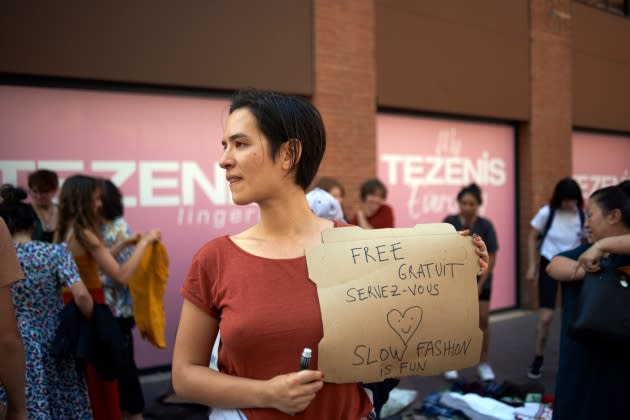[ad_1]

Style Revolution’s most current report released Thursday displays vogue is ill-worried with measurable progress on incredibly hot-button sustainability problems.
Now in its seventh version, the Style Transparency Index is an yearly report ranking 250 of the world’s biggest vogue makes and retailers dependent on publicly accessible facts throughout human rights and environmental difficulties. Due to the fact November, Fashion Revolution has been conducting its investigation for this year’s report, which include engagement and outreach to scoring brand names. The Laudes Foundation is between the funding associates.
Much more from WWD
In accordance to the report, topline sustainability challenges like overproduction, supply chain transparency and residing wage information are continually falling by the wayside. Manufacturers represent a cross-area of the market and are rated involving to 100 % (better getting improved), according to their disclosure on a 246-deep questionnaire. The questionnaire covers a broad variety of social and environmental topics, like animal welfare, chemical and drinking water management, weather, forced labor, living wages, buying tactics, supplier disclosure and squander.
Brand names achieved an normal score of just 24 %, with almost a third of makes scoring considerably less than 10 percent.
Amid the very best-performers by Manner Revolution’s counts ended up Italian model OVS, which scored greatest once again this calendar year with 78 per cent, tied with Kmart Australia and Focus on Australia. H&M, The North Deal with and Timberland followed suit, tied at 66 per cent. A noteworthy mover and shaker this calendar year was Dutch clothing chain Zeeman for likely over and past on its owing diligence-aligned supplier code of perform.
On the base rung of placement, 17 significant makes scored a dismal per cent, amid them Jil Sander, Manner Nova, Max Mara, Tom Ford and Elie Tahari. Conclusions ended up not prescriptive to just about every model but noted a lack of public disclosure on governance, policies and more.
Local weather, provider owing diligence and forced labor indicators had been among the telling agony points impacting the over-all scores.
Even with the urgency of the local weather disaster, considerably less than just one-3rd of major manufacturers disclose a decarbonization goal covering their total offer chain, which is confirmed by the frequent corporate safeguard the Science-Based mostly Targets Initiative. Only 11 per cent of makes publish their supplier wastewater exam outcomes, despite the textile marketplace currently being a leading contributor to water air pollution. And the bulk of brand names, or 85 percent, do not disclose their yearly creation volumes in spite of mounting garments waste. Most major manufacturers and merchants, or 96 percent, do not publish the range of employees in their supply chain who are paid a living wage.
Locating it tricky to steer towards any one particular dominant perception, Liv Simpliciano, Trend Revolution’s policy and investigation manager and report research guide, pressured in a cellphone conversation with WWD: “They’re all interrelated and all have nuance…What stunned me the most was 125 out of 250 brands’ total rating is concerning and 5 p.c. I consider it’s definitely stark that we have these minimal disclosure.”
Homing in on a couple of outliers, she explained acquiring procedures are in an “abysmal” condition of affairs with only 11 per cent of makes abiding by a advisable getting code of carry out that defines 60-day payment phrases. Payment conditions have an affect on the skill of manufacturers and workers to get paid in a timely method.
Simpliciano also referred to as focus to how this year’s report incorporates new indicators of fashionable slavery. Forced labor turned an space of scrutiny amid tainted cotton from Xinjiang and ongoing investigations into U.K. quick style suppliers.
Suggestions like the Employer Pays Theory, which instructs organizations on liable recruitment (as manner is an market of attract to migrant workers who are recruited by factories and may confront few entry-stage possibilities if undocumented) and to pay back the full costs of recruitment, underpin Style Revolution’s tips and methodology. “I believe it is also important to bear in mind that indebted workers are much less possible to bargain for better pay since they are already in an exploited and vulnerable position,” Simpliciano said.
Style Revolution thinks that after transparency will come great scrutiny, accountability and lastly — change.
Simpliciano reported she expects a style transparency “reckoning” in the in the vicinity of future, provided the controversy all over primary instruments. The nonprofit will be part of an approaching initiative called “Good Dresses, Honest Pay” which launches July 19 in an aim to garner recognition — and signatures — for dwelling wage legislation in the EU. Trend Revolution also operates community campaigns this sort of as its notorious “Who Built My Garments?”
Indication up for WWD’s E-newsletter. For the newest information, abide by us on Twitter, Facebook, and Instagram.
[ad_2]
Source hyperlink



More Stories
What Are the Benefits of Custom-Made Jewelry?
Sabika Necklaces
Celebrities Are Wearing CZ Jewelry